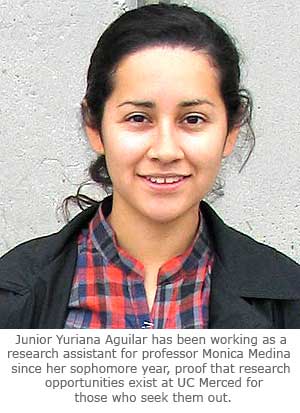

UC Merced promises to offer students the opportunity to conduct
researchearly in their academic careers. Junior Yuriana Aguilar is proof that the campus - and its faculty - makes good on its word.
The
biological sciencesmajor from Fresno has been working in
Monica Medina’slab since her sophomore year.
Medina’s labstudies how environmental stressors, such as elevated sea surface temperature and ocean acidification, affect the life history of
coral reefs.
Since taking the initiative to explore the research opportunities within the
School of Natural Sciences, Aguilar says she’s found a wide network of people willing to take her under their wings and give her access to graduate-level work.
“Professor Medina has helped me by opening the doors of her lab,” Aguilar said. “But the most valuable resources she’s given me is access to are her
graduate students. They offer a wealth of experience and information.”
Aguilar approached Medina for the opportunity to work in her lab, and she’s been equally proactive in pursuing other research opportunities. For example, she applied to and was selected for both the UC Leadership Excellence through Advanced Degrees
(LEADS)and Community Scholars programs.
As a UC LEADS scholar, Aguilar gets paid summer research experience in addition to what she’s already doing during the school year, invitations to systemwide symposia, and the ability to attend scientific society meetings and academic enrichment opportunities.
“The program is great,” she said, adding that it has allowed her to become a better researcher as she prepares for the rigors of graduate school.
The Community Scholars program has paired Aguilar with Building Healthy Communities as an intern to help Merced County create a healthier environment for its residents. Aguilar joined the program to put her UC-learned knowledge to use beyond the campus’ borders.
“The program gives students the ability to work with the community to address its most pressing issues,” she said.
One of those issues is how health-care decisions are made. It’s not uncommon for doctors to make decisions without patient input. But getting doctors to enlist feedback from patients is difficult when they don’t speak the same language and require the assistance of an interpreter.
That’s where Aguilar comes in. For her role in the project, she observes the interaction between doctor and interpreter, and patient and interpreter to see if the interpreter is relaying accurate information and facilitating a conversation that leads to shared decision making between the doctor and patient.
This project feeds directly into Aguilar’s goal of becoming a doctor, and her work in Medina’s lab is preparing her for the demands of medical school.
“The rigors of research and medical school are both pretty high,” she said.
With about 18 months left to go before earning her bachelor’s degree, Aguilar is poised to be a standout candidate for graduate or medical school. She has UC Merced to thank for that. Where else could an undergraduate interested in medicine be able to work with marine biologists on cutting-edge environmental research?
“It never hurts to learn things out of your field,” she said. “It makes you grow skills in various areas - always a good characteristic to have.”






